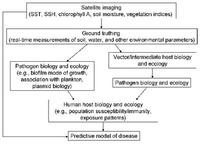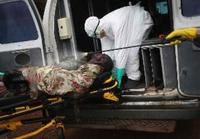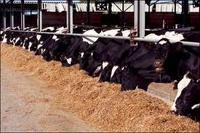-
World's response to Ebola slow, inconsistent, inadequate: Médecins sans Frontières
The NGO Médecins sans Frontières (MSF) has harshly criticized the international community for its slow and inconsistent response to the Ebola crisis in West Africa. MSF says the world’s response risks creating “a double failure” because ill-equipped locals in Sierra Leone, Liberia, and Guinea have been left to run hospitals and treatment centers. MSF international president, Dr. Joanne Liu, said it was “extremely disappointing that states with biological-disaster response capacities have chosen not to deploy them.”
-
-
Satellites help assess risk of epidemics

Changes in the environment, global trade, and travel are all factors in the ever-increasing numbers and movement of pests. Identifying and predicting the distribution of existing local species as well as the spread of new exotic ones are essential in assessing the risk of potential epidemics. Researchers have developed Vecmap — an all-encompassing software and services package including a smartphone app for field studies with a time and location information system, all linked to an online database. The database pools satellite information with results from field research, and satnav adds location information. The new approach greatly reduces the complexity of tracking species compared to traditional methods.
-
-
Portable, fast Ebola test kit in trials in Guinea
Scientists say that early diagnosis is key to surviving Ebola once a person has been infected. Roughly 50 percent of those known to be infected with Ebola have died, but scientists hope to reduce the number as a new test designed to diagnose the Ebola virus in humans in under fifteen minutes will be tried out at a treatment center in Conakry, Guinea. The test is six times faster than tests currently used in West Africa.The mobile testing device is one of six projects jointly funded by Wellcome and the U.K.’s Department for International Development under the 6.5 million pounds Research for Health in Humanitarian Crises initiative.
-
-
Subjects produce immune response, develop antibodies in Ebola vaccine test
All twenty research subjects recruited by the University of Maryland School of Medicine in partnership with the National Institute of Health (NIH) to test an experimental Ebola vaccine developed by the National Institute of Allergy and Infectious Diseases (NIAID) in collaboration with drug maker, GlaxoSmithKline, have produced an immune response and developed anti-Ebola antibodies. Half of the research participants were initially injected with ten billion particles of a chimpanzee cold virus modified to resemble Ebola, while the other half received a dose with ten times as many particles.
-
-
NIAID/GSK experimental Ebola vaccine appears safe, prompts immune response
An experimental vaccine to prevent Ebola virus disease was well-tolerated and produced immune system responses in all twenty healthy adults who received it in a phase 1 clinical trial conducted by researchers from the National Institutes of Health. The results from the NIH Phase 1 clinical trial will support accelerated development of candidate vaccine.
-
-
Developing a global workforce to tackle emerging pandemic threats
When a new pandemic threat like this year’s Ebola outbreak emerges, the importance of preventing and limiting disease spread becomes apparent. Well-trained global health professionals play a key role in preventing and responding to emerging zoonotic disease. Under a new 5-year award of up to $50 million, the University of Minnesota and Tufts University will be part of an international partnership of universities to strengthen global workforce development against emerging pandemic threats.
-
-
Public health officials work to ensure that the lessons of Ebola are not forgotten
Hospitals find it difficult to remain fully prepared for disease outbreaks because they rarely occur and preparation and frequent training are expensive. Public health professionals and infectious disease experts are working to ensure that lessons learned and protocols put in place in response to the Ebola outbreak will be used to prevent and respond to future virus and disease outbreaks.
-
-
Pre-empting flu evolution may make for better vaccines
Influenza is a notoriously difficult virus against which to vaccinate. There are many different strains circulating — both in human and animal populations — and these strains themselves evolve rapidly. Yet manufacturers, who need to produce around 350 million doses ahead of the annual flu season, must know which strain to put in the vaccine months in advance — during which time the circulating viruses can evolve again. An international team of researchers has shown that it may be possible to improve the effectiveness of the seasonal flu vaccine by “pre-empting” the evolution of the influenza virus.
-
-
Scientists identify weak spots in Ebola’s defenses
Scientists have identified weak spots on the surface of Ebola virus that are targeted by the antibodies in ZMapp, the experimental drug cocktail administered to several patients during the recent Ebola outbreak. “The structural images of Ebola virus are like enemy reconnaissance,” said one of the scientists involved in the research. “They tell us exactly where to target antibodies or drugs.”
-
-
Using data to fight Ebola
The current Ebola outbreak is the largest in recorded history, claiming more victims than all previous twenty major outbreaks combined since Ebola was discovered in 1976. Governments and the private sector are using the latest data technology to process, store, and analyze information and communication records from Ebola-stricken countries to help locate and predict the spread of the disease.
-
-
Ebola’s ‘other’ victims: how the outbreak affects those left behind
Media coverage of the growing Ebola epidemic in Guinea, Sierra Leone, and Liberia has presented world audiences with apocalyptic predictions of ultimate death tolls and grisly imaginings of its spread to other shores. But we’ve heard little about the people left behind. What impacts has the epidemic had on their livelihoods? For many among the twenty-five million people of Guinea, Sierra Leone, and Liberia, Ebola is not just an epidemiological terror, it is also a socioeconomic disaster. Dealing with setbacks in achieving regional development priorities is both secondary to, and dependent upon, coping with the immediate effects of near-total economic shutdown. The Ebola crisis thus presents a cruel paradox. Efforts desperately needed to contain the infection of thousands are simultaneously causing major, and in some cases severe, economic hardship for a population of millions. The international Ebola response will need to continue well after the crisis has faded from world news reports.
-
-
The economics of Ebola
Economists are being called upon to estimate the costs of the Ebola epidemic to West Africa and elsewhere. Economists, however, should also play a part in estimating the likelihood of the disease spreading. Economics is the study of incentives, and many biological models of the spread of the disease may be underestimating the impact of individual incentives. Based on cost-benefit analysis, the potential costs of Ebola spreading are extremely high and the risks may be much higher than they are currently portrayed. Voters and donors should support greater efforts to end Ebola in West Africa. As International Monetary Fund director Christine Lagarde says, “real action” is needed to counter the outbreak. Without such action Ebola places the global economy at risk.
-
-
U.S. will not see an Ebola epidemic – not even a serious outbreak: Scientists

Twenty-five years ago, the United States experienced its first Ebola outbreak in a Reston, Virginia primate facility which shipped animals to research labs throughout the country. Jerry Jaax, one of the scientists who worked at the primate facility at the time and who is now an associate vice president for research compliance and university veterinarian at Kansas State University, believes that the United States is well prepared to handle the Ebola virus. “We won’t have an epidemic or even a serious outbreak,” said Jerry Jaax. “The thing about it is we’ve got a zero risk tolerance bar that we set that says we can’t afford to have one person get infected or it’s a disaster. You can’t ever say never in biology and there are a lot of wild cards thrown in there, but I think basically the United States is ready.”
-
-
Ebola discussion in U.S. driven by fear, not science: Infectious disease experts
A significant part of the Ebola debate in the United States has been driven by fear, not science, according to infectious disease experts. Despite assurances from public health officials, the general public continues to be fearful of an Ebola outbreak in the United States. Some states have imposed mandatory quarantines for all healthcare workers returning from Ebola-stricken West Africa, even if they show no symptoms.”The fear is trumping science,” said Dr. Georges Benjamin, executive director of the American Public Health Association.
-
-
Protecting the U.S. food supply from agroterrorism

“For the life of me, I cannot understand why the terrorists have not attacked our food supply because it is so easy to do,” said Tommy Thompson during his 2004 farewell speech when he left his post as U.S. secretary of Health and Human Services. Documents found in a 2002 U.S. military raid on an al-Qaeda warehouse showed that terrorists sought to contaminate the U.S. food supplies. The documents included detailed instructions for attacking U.S. agricultural assets. Researchers at the University of California-Davis’ Western Institute for Food Safety and Security(WIFSS) are studying vulnerabilities of the U.S. agricultural system to the threats of agroterrorism.
-
More headlines
The long view
A Shining Star in a Contentious Legacy: Could Marty Makary Be the Saving Grace of a Divisive Presidency?
While much of the Trump administration has sparked controversy, the FDA’s consumer-first reforms may be remembered as its brightest legacy. From AI-driven drug reviews to bans on artificial dyes, the FDA’s agenda resonates with the public in ways few Trump-era policies have.
